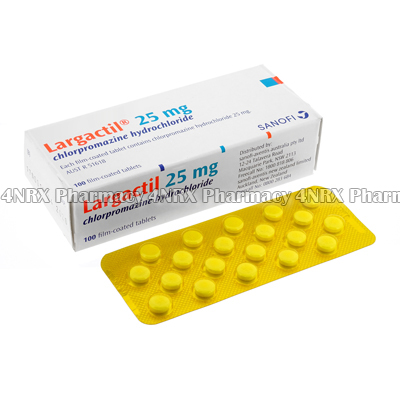 |
Home  Antidepressants Antidepressants  Largactil (Chlorpromazine HCL) Largactil (Chlorpromazine HCL) |
|
|||||||||
|
|
Largactil (Chlorpromazine HCL)
What is Largactil (Chlorpromazine HCL) used for? Largactil (Chlorpromazine HCL) is a phenothiazine antipsychotic prescribed to treat patients with schizophrenia or manic episodes. The medication operates by balancing levels of neurotransmitters in the brain to prevent symptoms such as disorganized thinking, hallucinations, or irritability. This function also makes it useful for treating anxiety, persistent hiccups, or vomiting caused by terminal illnesses. Your physician may prescribe it to treat other unlisted conditions, as well. How should I use Largactil (Chlorpromazine HCL)? Largactil (Chlorpormazine HCL) is usually prescribed to be taken two to four times each day, but the best dosage will be determined by your doctor after observing your symptoms and health condition. Swallow the tablets whole with a large glass of water to aid absorption. Do not split, crush, or chew the medication before use as this may destroy or change the effects of their contents. Ask your pharmacist or physician any questions you have to ensure the correct application. What are the side effects of Largactil (Chlorpromazine HCL)? Largactil (Chlorpromazine HCL) may cause side effects in some patients such as:
Immediately inform your physician if any more serious side effects occur including faintness, tremors, flu symptoms, unusual thoughts, halted urination, seizures, slowed heart rate, or jaundice. These conditions may require immediately medical assistance or adjustments to your regimen to prevent further complications from appearing. Please Note Do not begin using Largactil (Chlorpromazine HCL) if you have cardiovascular disease, anemia, or chronic comatose states. Also disclose if you have epilepsy, diabetes, myasthenia gravis, glaucoma, dementia, heart disease, risk of stroke, or clotting disorders. These conditions may cause unexpected complications during treatment requiring reduced dosages. Strictly follow all instructions provided to you by your physician or pharmacist while using Largactil (Chlorpromazine Hydrochloride). Optimum and safe dosage can differ based on the patient and the condition being treated. As this medication may be unsafe for certain patients, it is essential you always inform your physician if you are pregnant or breastfeeding, as well as if you have any allergies, other illnesses, or ongoing health conditions, and if you are taking any other form of medication, supplements, or herbal products. Immediately seek emergency medical care if you have an allergic or hypersensitive reaction. Common signs of a reaction include hives, swelling, skin rashes, chest pains, as well as trouble breathing or swallowing. 


|
||||||||||||||||||||||